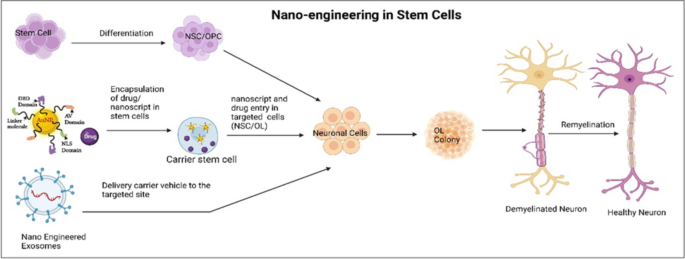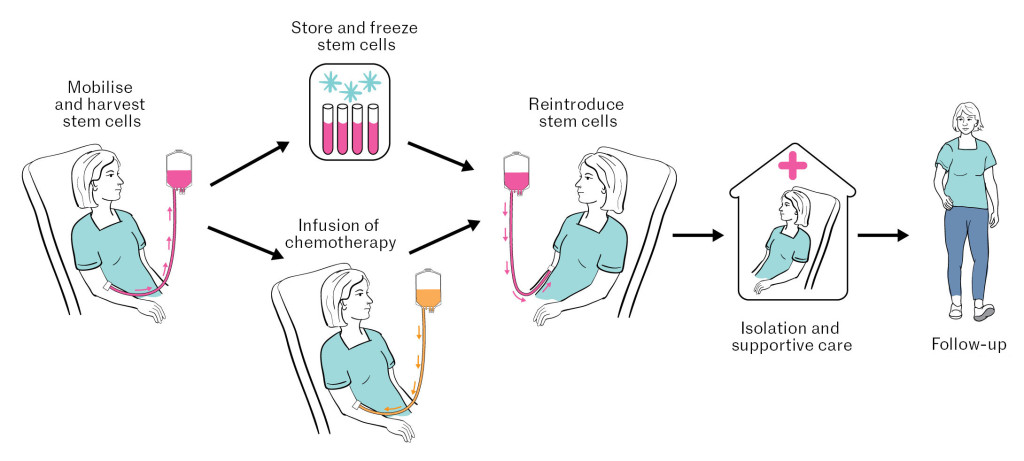Getting The Regenerative Medicine For Multiple Sclerosis To Work
Regenerative Medicine For Multiple Sclerosis - An Overview
Table of ContentsWhat Does Regenerative Medicine For Multiple Sclerosis Mean?3 Easy Facts About Regenerative Medicine For Multiple Sclerosis ExplainedNot known Facts About Regenerative Medicine For Multiple SclerosisThe Only Guide to Regenerative Medicine For Multiple SclerosisThe Best Strategy To Use For Regenerative Medicine For Multiple Sclerosis8 Simple Techniques For Regenerative Medicine For Multiple SclerosisIndicators on Regenerative Medicine For Multiple Sclerosis You Need To Know
The mesenchymal stem cells transplanted throughout stem cell therapy can divide and develop to create brand-new cells that can take the place of the damaged cells of the nervous cells. This might recover neurological features in patients with this problem. These benefits of stem cell therapy are further sustained by the ability of MSCs to promote recovery.Clients with several sclerosis are normally treated with mesenchymal stem cells. These are multipotent stem cells that have the capacity to separate and grow to form a wide variety of cell key ins the body. As soon as hair transplanted, these stem cells can establish to form healthy afferent neuron thus sustaining the regrowth of the damaged tissues of the nerve system.
As soon as transplanted, the stem cells move to areas of inflammation or damages within the central worried system (CNS). They are normally attracted to the sites of injury where the body immune system is striking the myelin sheath, the safety covering of nerve fibers. The stem cells function by advertising the fixing and regeneration of harmed myelin, potentially restoring feature to influenced nerve cells.
Things about Regenerative Medicine For Multiple Sclerosis
Stem Cell Research on MS The National Numerous Sclerosis Culture, along with various other companies, is actively funding and sustaining research into mesenchymal stem cell therapy for numerous sclerosis to discover their prospective and improve therapy methods. The objective is to create more secure and much more reliable ways to use stem cells in dealing with MS.
Regenerative Medicine For Multiple Sclerosis Can Be Fun For Everyone
Here are below from patients of individuals Swiss Medica clinic. The person traveled from Romania seeking therapy for MS after listening to positive feedback about stem cell treatment for the illness.
Get a cost-free online assessment to learn just how stem cells will work for your instance, and what are the period and cost of the therapy. Uccelli, A., Laroni, A., Brundin, L., Clanet, M., Fernandez, O., Nabavi, S. M. Regenerative Medicine for Multiple Sclerosis., Muraro, P. A., Oliveri, R. S., Radue, E. W., Sellner, J., Soelberg Sorensen, P., Sormani, M. P., Wuerfel, J. T., Battaglia, M
Stem cells are cells in the body that can mature into specialized cells that serve a specific functionParticular There are two main types of stem cells: embryonic stem cells and adult stem cells.
are found in some adult tissues and body organs including the bone marrow, skin, blood, and mind. Adult stem cells are not as flexible as embryonic stem cells and are as a result more restricted in terms of the kinds of cells they grow right into. The one-of-a-kind residential properties of stem cells offer guarantee for new treatments that can slow/halt MS condition activity and repair cells damage in the central nerves.
Regenerative Medicine For Multiple Sclerosis for Beginners

The treatment entails collecting stem cells from an individual's very own (autologous) bone marrow. The individual is after that treated with radiation treatment to diminish the immune system and stem cells are reintroduced right into the body where they develop right into brand-new, healthy and balanced immune cells - Regenerative Medicine for Multiple Sclerosis. Stem cells can be infused into the body in various methods

In 2000, the MS Culture of Canada and MS Scientific Research study Structure moneyed a scientific test entailing HSC transplants, led by Drs. Mark Freedman and Harry Atkins from the Ottawa Healthcare Facility Research Institute/University of Ottawa. The aHSC treatment offered in Canada is a therapy that makes use of high-dose chemotherapy, also called conditioning.

A Biased View of Regenerative Medicine For Multiple Sclerosis
Neural stem cells (NSC) are discovered in the mind and can grow into see here now different kinds of mind cells including nerve cells, oligodendrocytes, and astrocytes. NSCs may serve to repair or shield the mind and modulate the immune system. Early scientific tests in non-human primates showed that therapy with NSCs profited the progression of MS-like illness in pet versions.
The outcomes from these safety and security research studies are favorable for future stem cell and regenerative medication treatments in MS. Future medical tests (phase 2 and 3) with larger varieties of participants and controls are essential to analyze the efficacy of this treatment for MS. As shown by the instances over, there is a huge variety of study occurring that will certainly provide added responses concerning making use of stem cells to treat MS.
Stem cell therapy is taken into consideration secure, her response however, like any type of clinical treatment, it carries some risks, such as temporary swelling or pain at the injection site. Severe side effects are unusual when executed by certified professionals.
Rumored Buzz on Regenerative Medicine For Multiple Sclerosis
Multiple sclerosis (MS) is a persistent disease of the central nerves that impacts the mind and spine cable. It is characterized by the destruction of myelin, a material that covers nerve fibers, leading to disturbances in interaction between the mind and the rest of the body. Signs and symptoms can vary commonly and consist of muscle weakness, vision problems, discrepancy, and tiredness.
Numerous sclerosis is characterized by the body immune system incorrectly attacking the protective sheath (myelin) that covers nerve fibers, causing communication concerns between the brain and the remainder of the body. The illness can result in the deterioration or irreversible damage of nerves. Signs and symptoms differ extensively among clients and can include tiredness, flexibility concerns, pain, and cognitive modifications.